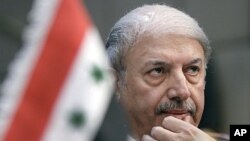The Arab League has voted to suspend Syria four days from now if it fails to adhere to an initiative to end a crackdown on anti-government protests.
Arab League members voted overwhelmingly for Syria's suspension and to impose both political and economic sanctions on Wednesday, unless Syria lives up to its promises. Qatari Foreign Minister Hamid bin Jassim al Thani said the decision was made because of Syria's lack of complete and immediate implementation of the league's peace plan.
The Qatari diplomat, speaking after a meeting at league headquarters in Cairo Saturday, said it would be up to member states to decide whether to withdraw their envoys from Damascus as well.
Syria's ambassador to the league, Yousef Ahmed, rejected the decision as illegal and against the league charter. He called it a clear case of the alliance working under an American and Western agenda.
Syria's opposition, human-rights groups and amateur video reports indicate the violence has, if anything, only grown worse since November 2, when Damascus agreed to a league plan to pull back its forces from the streets, start a dialogue with the opposition, allow in journalists and monitors, and release all political prisoners.
More than 100 people are believed to have been killed in Homs in the past week alone.
The United Nations says more than 3,500 people have been killed since the uprising began in March.
Damascus argues it is battling foreign-backed thugs and terrorists and is merely using its forces to protect civilians. It also points to the recent release of 500 prisoners. Opposition and rights groups estimate the number still in jail to be in the thousands.
Eighteen Arab League members dismissed Syria's arguments, voting for the suspension threat. Syria was joined in opposition only by neighboring Lebanon and Yemen, where the government also faces massive protests. Iraq abstained.
The regional bloc had been under increasing pressure from opposition groups to move more strongly against Syria or cede responsibility for action to the United Nations.
Qatar's bin Jassim al Thani continued to rule out a call for international intervention, in particular speaking against a no-fly zone, as was imposed on another league member, Libya. He argued that, for now, dialogue between the Syrian government and its opponents is the answer.
"The Syrians have to decide for themselves, not us. We are trying to prepare the [climate] where they can talk together seriously and quickly to reach a solution for the dilemma in Syria, but we cannot talk on their behalf."
But he added that depending on Syria's response, the league will hold a further meeting in Morocco on November 16 to decide its next step to find an end to the violence.
Arab League Moves to Suspend Syria Over Crackdown




